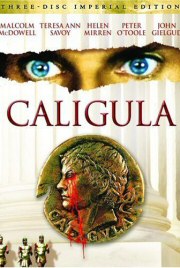 With the temperature dropping, it's time to find someone to keep you warm. Find your hookups with our online dating guide!
With the temperature dropping, it's time to find someone to keep you warm. Find your hookups with our online dating guide!
- Rated NR
- Drama
- 1980
- Buy the DVD
Reviewed by Will Harris
()
The reputation of “Caligula,” the motion picture about the cruel, perverse and possibly insane Emperor who reigned over Rome from 37 to 41 A.D, is such that people who haven’t seen the film can never believe it’s really as awful as it’s said to be. There is no documented case, however, of any of those skeptics finally seeing the film and saying, “Oh, it wasn’t that bad.” That’s because it is that bad…and possibly worse. It was just a little more than 27 years ago that Roger Ebert famously opened his review of “Caligula” by describing it as “sickening, utterly worthless, shameful trash,” and while the bar on sickening, utterly worthless, shameful trash has been raised pretty high since then, this flick still meets the criteria with precious little effort.
From William Wyler’s “Ben Hur” to Ridley Scott’s “Gladiator” to HBO’s critically-acclaimed series, “Rome,” there’s ample proof that tales can be told of the violence and debauchery of ancient Rome without leaving permanent psychological scars on the viewer. While there may be some semblance of historical accuracy to be found within the 156 minutes of “Caligula” – and if there isn’t now, there probably was at one time, since the original screenplay was written by Gore Vidal – it’s forgotten in the midst of the filmmakers’ attempts to break new cinematic ground for all the wrong reasons. In fact, one wonders how it’s humanly possible for a motion picture, staring a cast that cumulatively possesses two Oscars, six Emmys and eight Golden Globes, can be made and yet still proves to be such a disconcerting viewing experience that even the act of doling out zero stars feels far too charitable.
Certainly, the majority of the blame must fall upon the shoulders of the film’s producer, Bob Guccione, who financed the flick with the money from his Penthouse Magazine coffers, and rarely lets us forget it. In particular, the unrated, uncensored version of the film contains more gratuitous shots of asses, breasts, vaginas and penises than you’d expect from a film that doesn’t feature performers with names like Dick Hardwood or Steamie Thize. There’s even a fisting sequence, for God’s sake! The film’s shocks extend beyond the sexual, however, and into the realm of violence, including scenes of decapitation, disembowelment, and…well, honestly, once you’ve cited those two things, you don’t really need to go any farther, do you? In any case, you almost certainly can’t pin all that on Guccione.
It’s fair to suspect that the film’s original director, Tinto Brass, had something to do with it, though perhaps not much. Brass’s final title in the credits reads, “Principal Photography by,” which is first followed by the statement, “Editing by the production,” then by the clarification, “Additional scenes directed and photographed by Giancarlo Lui and Bob Guccione.” Between these odd credits, and the equally disconcerting statement that the film is “adapted from an original screenplay by Gore Vidal,” it’s no wonder that both the unrated, uncensored version and the alternate pre-release version of “Caligula” each feel as though they’ve been haphazardly pieced together from the vision of several different people. As to the acting performances, it’s clear that it was at best an afterthought for both Guccione and Brass, but to be fair, McDowell and O’Toole attack their respective roles with vigor (sure, they’re over the top, but they’d have to be to make any sort of impact in this film), while Gielgud and Mirren are possibly the only thespians in the production about whom the word “understated” could be used as a descriptor.
Once upon a time, “Caligula” might have had the potential to be a true Roman epic that explored one of history’s most infamous and notorious figures. Instead, it ended up almost as infamous and notorious as its subject…and that’s not a compliment.
Three-Disc Imperial Edition DVD Review:
You’d think the special features on such an awful film would be equally worth of dismissal, but that couldn’t be further from the truth. “Caligula: The Imperial Edition” provides a tremendous amount of insight into this car wreck of a motion picture, and it’s done with full comprehension of how ghastly and repellant it can be.
Both McDowell and Mirren provide separate commentary tracks, as does writer Ernest Volkman, who served as Penthouse Magazine’s journalist of record on the set of the film. All three are interesting, but McDowell’s proves to be the best of the bunch, as he freely acknowledges how awful and ridiculous the film can be, mocking it mercilessly throughout. (At one point, he interrupts his own train of thought to observe of one of his co-stars, “Look at that arse!”) Co-stars John Steiner and the still-hot Lori Wagner both offer new on-camera interviews about their careers and, specifically, their experiences on this film. Steiner says it most succinctly when he observes, “It was a hideous experience, I did not enjoy it, but, of course, it made me some money, and I was able to buy a house.”
The new conversation with Tinto Brass gets the biggest laugh at its beginning, with the on-screen warning, “The following conversation contains spoilers,” but it provides considerable insight into his clashes with both Guccione and Vidal. The making-of documentaries, compiled at the time of the film’s production and release, are possibly more illuminating than any of the new interviews or commentaries, particularly via the comparison between the laughably intellectual Vidal, who’s leaning against a lamppost while sporting a business suit, and Guccione, who addresses the camera with his shirt open down to his navel and his gold chains shining in the morning sun.
As indicated above, there are two versions of the film included here, along with deleted scenes, theatrical trailers, behind-the-scenes footage, never-before-seen photographs and a DVD-ROM that includes Vidal’s original script for the film. All told, it’s a 5-star release for a zero-star film. Yes, it seems ludicrous, but once you get past the movie itself, the DVD for “Caligula” is legitimately enthralling.
You can follow us on Twitter and Facebook for content updates. Also, sign up for our email list for weekly updates and check us out on Google+ as well.











